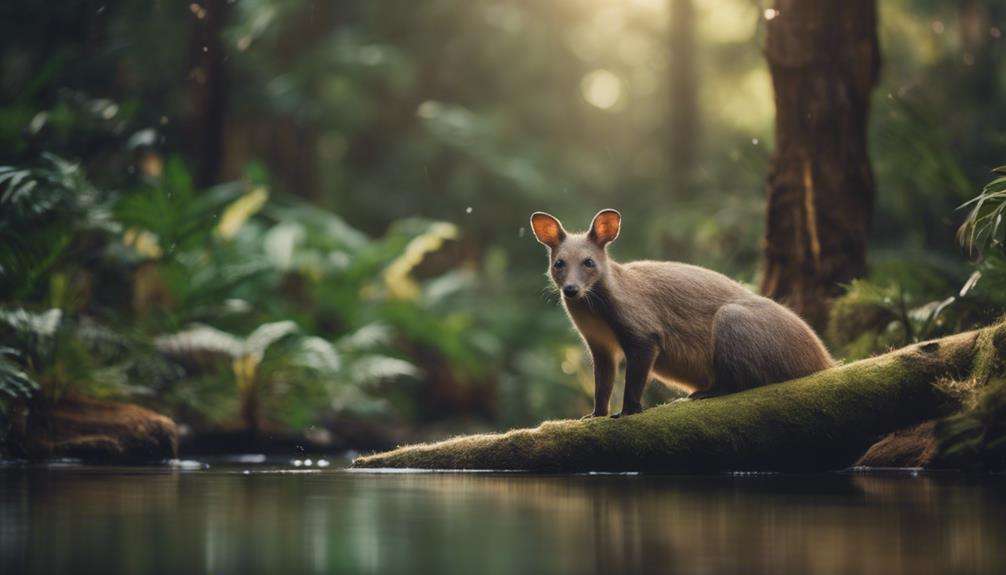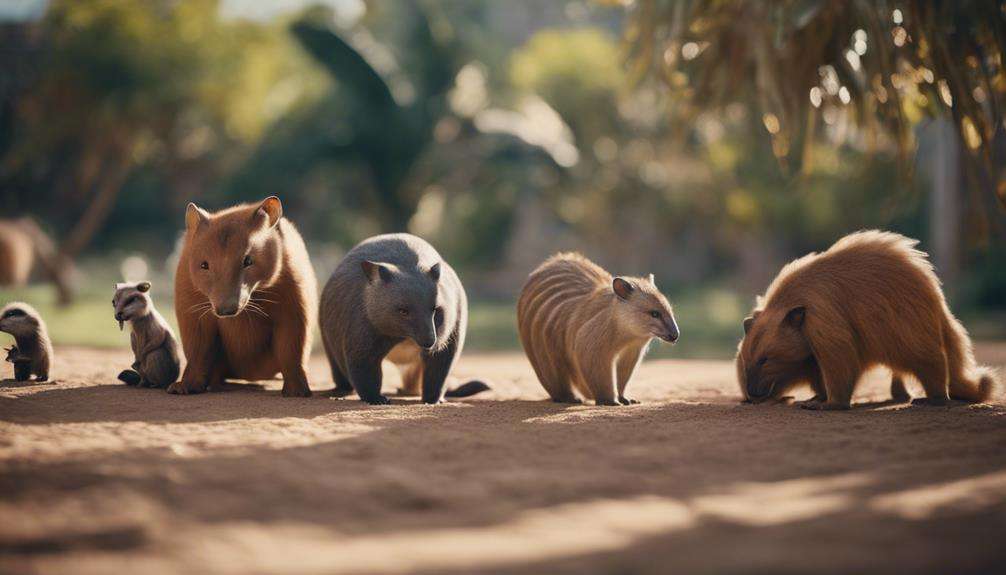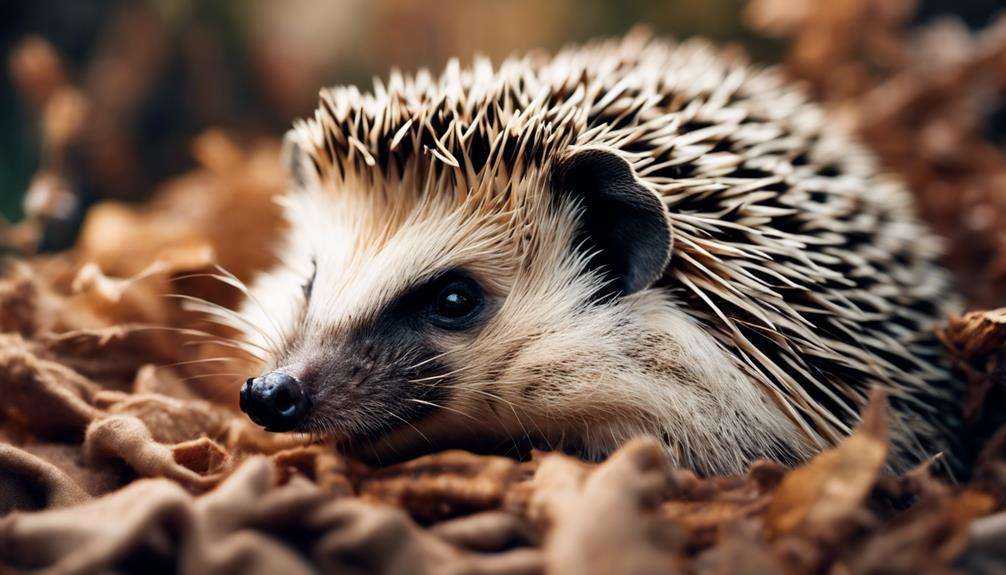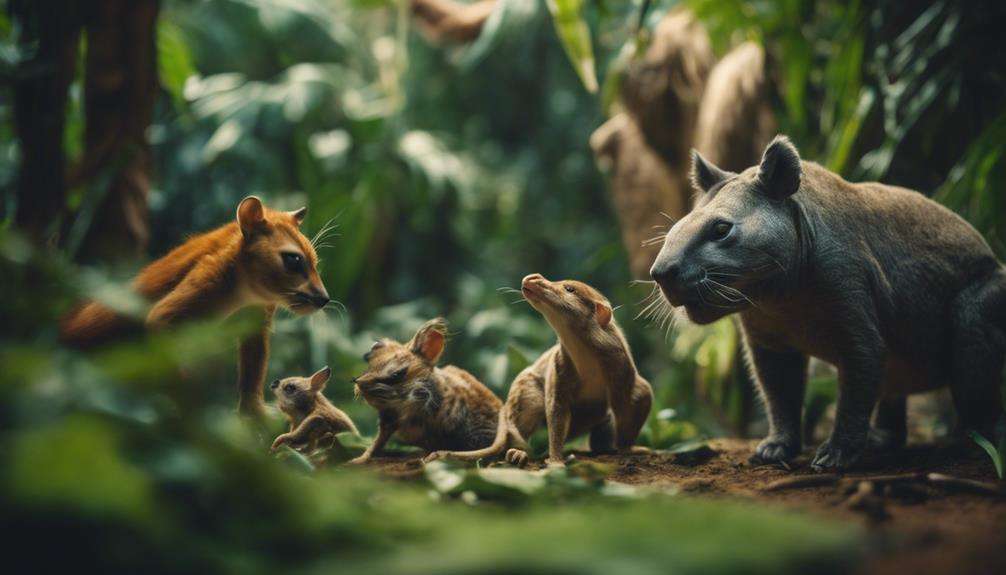Just like a well-oiled machine, the bodies of exotic mammals require precise fuel to function optimally. But why is this so crucial?
Imagine a scenario where these unique creatures are left to fend for themselves in an environment where their dietary needs are not met. The consequences could be dire, impacting not just their physical health but also their mental well-being.
Stay tuned as we explore the intricate connection between proper diets and the vitality of exotic mammals.
Key Takeaways
- Proper diets are crucial for exotic mammals' health and well-being.
- Balanced nutrition prevents deficiencies and supports immune function.
- Tailoring diets to species' needs contributes to longevity and vitality.
- Veterinary guidance ensures appropriate diet planning and nutritional support.
Importance of Exotic Mammal Nutrition
Proper nutrition is the cornerstone of ensuring the health and well-being of exotic mammals. As an exotic pet owner, providing a balanced diet is crucial for your furry friend's overall health. Exotic mammals have specific nutritional needs that must be met to prevent deficiencies and promote proper growth and development. A balanced diet not only supports their physical health but also plays a vital role in maintaining a robust immune system, helping your exotic pet ward off illnesses.
When crafting a diet for your exotic pet, it's essential to ensure they receive a variety of nutrients to support their energy levels and activity. Incorporating hydrating foods like juicy fruits and vegetables, along with an adequate water intake, is key to their well-being. Being mindful of toxic or harmful foods is equally important, as these can have detrimental effects on your exotic mammal's health. By prioritizing their nutrition and providing a well-rounded diet, you're actively contributing to your exotic pet's longevity and overall quality of life.
Nutritional Needs of Exotic Mammals
As an exotic mammal owner, understanding the unique dietary requirements of your furry companion is essential. Ensuring a balanced diet tailored to their specific needs can have a significant impact on their overall health and well-being.
Neglecting their nutritional needs could lead to severe consequences such as obesity or metabolic bone disease.
Unique Dietary Requirements
Understanding the unique dietary requirements of exotic mammals is crucial for their optimal health and well-being. Exotic mammals, being diverse in species, have varying dietary needs. Some are herbivores requiring high-fiber diets, while others, like carnivores, need high-protein meals.
Specific vitamin-rich foods are essential for certain species to thrive. Neglecting these dietary requirements can lead to severe health issues such as metabolic bone disease, infections, and dental problems.
By tailoring diets to meet the individual nutritional needs of exotic mammals, you can ensure they receive a balanced and healthy diet. Providing the right mix of nutrients is key to promoting their overall health, growth, and well-being.
Balanced Diet Importance
For exotic mammals to thrive and maintain optimal health, a balanced diet tailored to their specific nutritional needs is essential. Just like humans, exotic animals require a well-rounded diet to prevent nutritional deficiencies and support proper growth, development, and immune function. This tailored diet also plays a crucial role in regulating their energy levels and promoting an active lifestyle.
By providing exotic pets with a diet that meets their species-specific requirements, you're actively contributing to their longevity and overall vitality. A balanced diet for exotic animals should include essential proteins, fats, carbohydrates, vitamins, minerals, and proper hydration through adequate water intake.
Health Impacts of Nutrition
Proper nutrition plays a pivotal role in safeguarding the health and well-being of exotic mammals. These animals have specific dietary requirements, including calcium, vitamin D3, and vitamin A, crucial for their overall health.
Inadequate nutrition can result in metabolic bone disease, infections, and various other health issues in exotic mammals.
Providing balanced diets is essential to prevent common nutritional deficiencies and support growth, development, immune function, and overall well-being in these animals.
Understanding the unique nutritional needs of exotic mammals is vital for proper animal nutrition, ensuring appropriate care to prevent health problems.
Dietary Considerations for Exotic Mammals
When caring for exotic mammals, it's crucial to consider the diversity of their nutritional needs to ensure their health and well-being. Providing a balanced diet not only prevents deficiencies but also supports their overall vitality.
Nutritional Needs Diversity
Considering the diverse nutritional needs of exotic mammals, tailoring specific diets to meet their species' requirements is crucial for their overall health and well-being. Each exotic mammal species has unique dietary considerations that must be taken into account to ensure they receive the appropriate balance of protein, fat, carbohydrates, vitamins, and minerals.
Nutritional needs diversity among exotic mammals also involves factors such as hydration, fiber intake, and avoiding toxic foods. Failure to meet these specific dietary requirements can lead to nutritional deficiencies and various health issues. By understanding and addressing the individual nutritional needs of exotic mammals, caretakers play a vital role in promoting their optimal health, growth, and development.
It's essential to provide a well-rounded diet that caters to the diverse nutritional needs of these remarkable creatures.
Health Implications of Diet
Understanding the dietary considerations for exotic mammals is crucial to safeguarding their health and well-being, especially when it comes to the potential health implications of their diets. Metabolic bone diseases, like those resulting from inadequate calcium intake in herbivorous mammals such as iguanas, underscore the importance of providing species-specific diets.
Vitamin deficiencies, like Vitamin A in box turtles leading to infections or Vitamin C in Guinea pigs causing scurvy, emphasize the need for tailored nutrition. Dental issues, common in species with continuously growing teeth like rabbits, require precise diet management.
Benefits of High-Quality Exotic Diets

High-quality exotic diets play a crucial role in supporting the overall health and longevity of exotic mammals. When you provide your exotic pet with a high-quality diet, you're ensuring they receive the essential nutrients needed for optimal health. Here are some benefits of feeding your exotic mammal a high-quality diet:
- Prevention of Nutritional Deficiencies: High-quality diets help prevent nutritional deficiencies, ensuring your exotic pet gets all the necessary vitamins and minerals for their well-being.
- Promotion of Proper Growth and Development: Proper diets support the growth and development of exotic mammals, helping them reach their full potential.
- Boosted Immune System: Quality diets contribute to a strong immune system, helping your pet ward off illnesses and stay healthy.
- Improved Energy Levels and Activity: Balanced nutrition from high-quality diets improves energy levels and activity, allowing your exotic pet to be more active and engaged in their environment.
Feeding Schedule for Exotic Mammals
To ensure the optimal health and well-being of your exotic mammal, establishing a suitable feeding schedule is essential. When it comes to feeding exotic pets, the key lies in understanding their unique nutritional requirements.
Exotic mammals may need frequent, small meals spread throughout the day to fulfill their nutritional needs adequately. On the other hand, some species benefit from larger, less frequent meals that mimic their natural feeding patterns. Consistency in feeding times is crucial to guarantee that your exotic mammal receives all the necessary nutrients.
A well-planned feeding schedule not only prevents issues like overfeeding or underfeeding but also ensures a healthy and balanced diet for your furry companion. Tailoring the feeding schedule to suit the specific needs of your exotic mammal is vital for their overall well-being.
Hydration for Exotic Mammals

For optimal health and well-being, ensuring proper hydration is essential for exotic mammals like chinchillas, who require a minimum of 60 ml of water daily. Hydration plays a crucial role in maintaining the overall health of exotic mammals. Here are some key points to consider for keeping exotic mammals properly hydrated:
- Water Intake Requirements Vary: Different exotic mammal species may have varying water intake requirements, so it's important to research the specific needs of your exotic pet.
- Fresh Water is Critical: Providing fresh water is essential for exotic mammals to stay hydrated and healthy.
- Regular Cleaning is a Must: Regularly cleaning water and food dishes is crucial to prevent contamination and ensure proper hydration for exotic mammals.
- Consult a Veterinarian: Seeking guidance from a qualified veterinarian is vital to determine the appropriate water intake needs for your specific exotic mammal species.
Veterinary Guidance for Exotic Diets
Seeking guidance from a qualified veterinarian is vital when determining the appropriate water intake needs for your specific exotic mammal species. Veterinarians are essential in providing tailored nutritional guidance for exotic animals based on their unique species-specific requirements. They play a crucial role in preventing common deficiencies such as calcium, vitamin A, and thiamin by designing customized diet plans.
Owners must manage diets carefully to prevent malnutrition and dehydration issues commonly observed in exotic mammals. In cases of illness, veterinarians focus on nutritional support and fluid management as integral parts of the care provided to sick exotic animals. Understanding the natural history and nutrient needs of exotic mammals is fundamental for creating balanced and species-appropriate diets.
Frequently Asked Questions
Why Is It Important for Animals to Have the Correct Diet?
Having the correct diet is crucial for animals. It impacts digestive health, behavioral issues, and longevity and vitality. Ensuring proper nutrition supports overall well-being, preventing complications and promoting a healthy, happy life for your beloved pets.
Why It Is Important for Animals to Have the Proper Amount of Essential Nutrients?
Ensuring you have the proper amount of essential nutrients is crucial for your health. Nutrient balance supports vitality, dietary requirements promote longevity. Proper nutrition fuels your body, keeping you strong, active, and thriving. Your well-being depends on these essential elements.
Why Do Exotic Animals Need Special Care?
For exotic animals, special care is necessary due to their unique requirements. Consulting with a vet ensures tailored specialized diets for optimal health. Dietary supplements maintain nutritional balance crucial for exotic species' well-being.
Why Is Acquiring the Right Nutrition for Animals Important?
You might think balancing nutrition is just about eating right, but it's more than that. Achieving nutritional balance is crucial for your health maintenance. Your dietary requirements impact your overall well-being, energy levels, and longevity.
Conclusion
So, now you understand the importance of proper diets for exotic mammals.
You might be thinking, 'But it's so much work to ensure they get the right nutrition!' I hear you, but the health and well-being of your exotic pet are worth the effort.
With the right information and guidance, providing a high-quality diet can be manageable and rewarding. Your furry friend will thank you with their vitality and happiness.
Keep up the good work!






